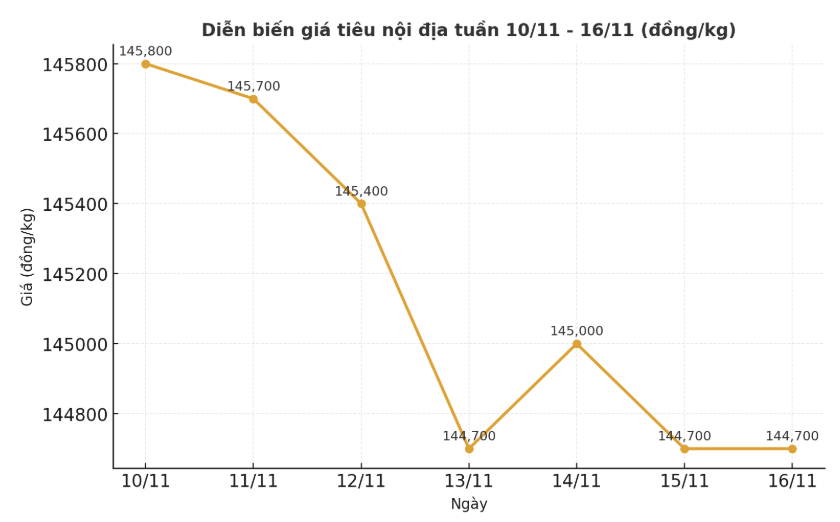Domestic pepper prices: Second week of price reduction
As of 1:30 p.m. today (November 16), domestic pepper prices are trading between 144,000 - 145,500 VND/kg, an average decrease of 1,000 - 1,500 VND/kg compared to last week depending on the region.
At the end of last week, Ho Chi Minh City and Dong Nai recorded a decrease of VND 1,000/kg, down to VND 144,000/kg. Meanwhile, the owner of the growing area in Gia Lai, which was the lowest area for many weeks, raised the price to 144,500 VND/kg.
Although it decreased by VND 1,000/kg, the highest price was still in Dak Lak and Lam Dong, commonly at VND 145,500/kg, down VND 1,500/kg compared to the previous week.

World pepper prices: Indonesia drops sharply
According to the International Pepper Company (IPC), world pepper prices have mostly decreased. The Brazilian exchange alone recorded a significant increase compared to the previous week.
Of which, the price of Indonesian black pepper decreased slightly by 3 USD/ton compared to last week, reaching 7,108 USD/ton. In the same direction, the price of Indonesian white pepper decreased by 4 USD/ton compared to last week, reaching 9,745 USD/ton.
In contrast, Brazil ASTA 570 black pepper prices increased by 75 USD/ton last week, to 6,175 USD/ton. Malaysia's ASTA black and white pepper prices remained unchanged for the whole week, selling at 9,200 USD/ton and 12,300 USD/ton, respectively.
In Vietnam, the export price of black pepper is around 6,400 - 6,600 USD/ton for 500 g/l and 550 g/l.
Assessment and forecast
Last week, US President Donald Trump signed a decree to exempt counterpartition fees for a series of foods such as coffee, tea, tropical fruits, fruit juice, cocoa beans, spices, bananas, oranges, tomatoes, beef and some fertilizers.
The Vietnam Pepper and Spices Association (VPSA) assessed that this decision is a good signal, and spice products imported into the US can reduce tax barriers if they are exempt. This is a favorable opportunity for Vietnam to regain market share in the US market if the enterprise meets import, quality and certification standards.
However, VPSA noted that exemption of counterpart tax does not mean exemption of all import taxes. Enterprises still need to comply with normal US import taxes, customs procedures, food safety standards, certifications, etc.











